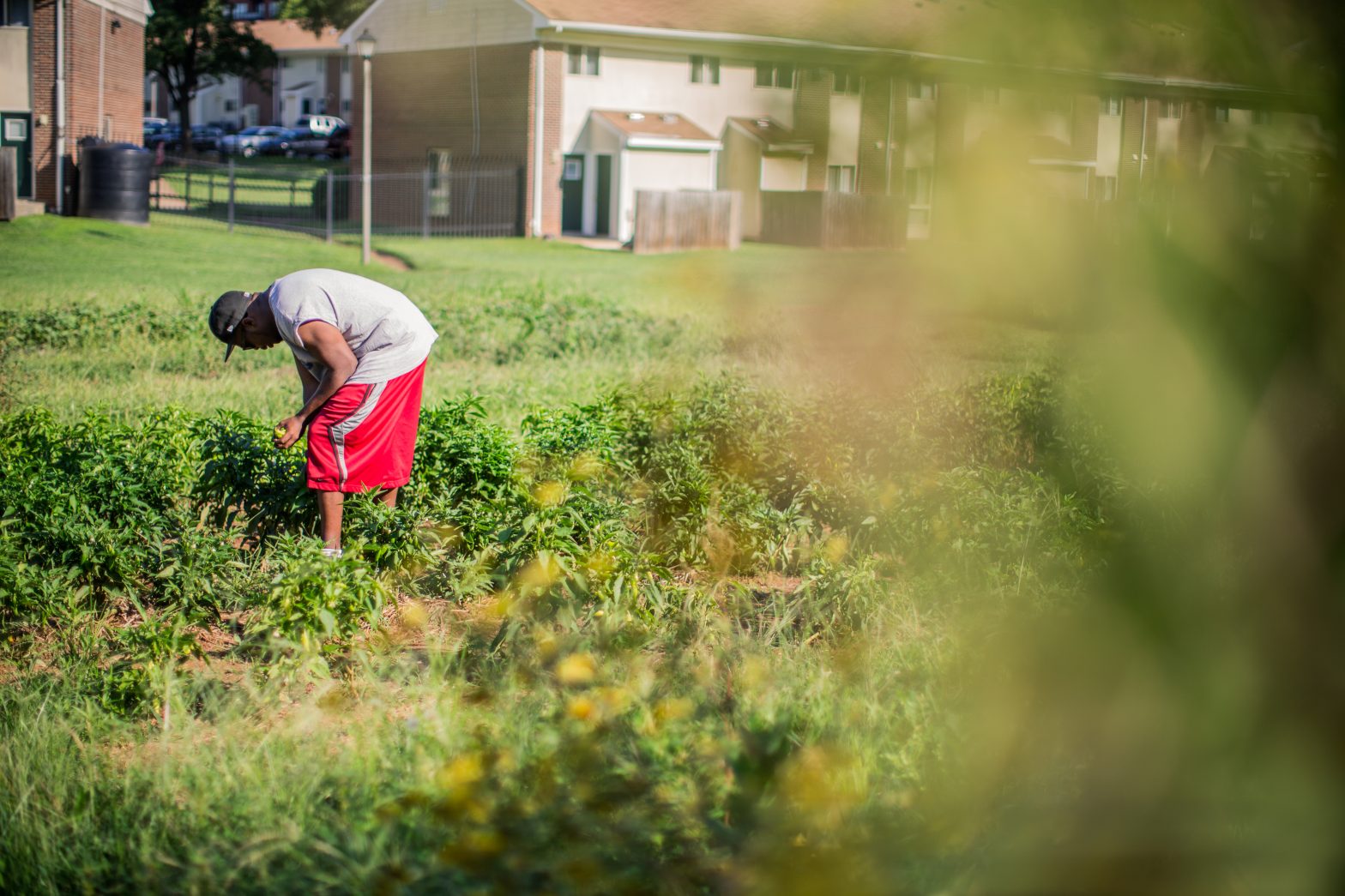Why isn’t more public green space used to grow food? Highway medians, the small lawns between sidewalks and apartments, public parks, all have the potential, and Richard Morris thinks about this more than most. The co-executive director of the food justice organization Cultivate Charlottesville knows the challenges and rewards of choosing a good garden location.
The group manages a community farm plot on West Street, one on the corner of Monticello Avenue and Sixth streets, and a new location behind the Charlottesville-Albemarle Technical Education Center.
Since 2018, Cultivate has been working with residents and city departments to locate a new plot for community gardening and food justice initiatives after the loss of agricultural land to needed housing redevelopment. At the top of the list is Booker T. Washington Park. In the summer months, the organization will facilitate discussions with community members about how urban agriculture could contribute to the park.
The 9.3-acre Booker T. Washington park is not the largest park in Charlottesville, but it is one of the most heavily used. It’s home to a sheltered picnic area, a pool, basketball courts, a baseball diamond, and a playground. Since 1989, the African American Cultural Arts Festival has been held in the park annually.
Washington Park’s strong culture is tied to its history, a history that is entwined with that of the 150-acre McIntire Park. In 1926, both plots of land were gifted to the city by Paul McIntire to be used as segregated parks, with McIntire reserved for white residents and Washington for Black residents. To this day, Washington Park receives a large amount of use from Rose Hill residents on the site of the former Rose Hill plantation.
“In [1944], there was a botanical exhibit at Washington Park, and there were something like 200 entries in the exhibit,” Morris says. “We don’t know exactly how many people participated, but the point is that at one point there were a lot of Black farmers in and around the Charlottesville area, certainly way more than we have now.”
Cultivate Charlottesville’s work in food justice cannot be separated from racial justice. The land to grow food, the wealth to buy food, and low-wealth neighborhoods’ access to affordable food, have all been dramatically impacted by racial inequities. Washington Park is embedded in that legacy.
“We’ve actually gone backwards, because if you look at Black land ownership today, and even home ownership, you just don’t have that,” Morris says. “You could not recreate that event today because there are not enough Black landowners, not enough Black farmers, not enough Black gardeners.”
Cultivate Charlottesville’s mission of food equity intersects issues of financial security and affordable housing. Providing food is important, but so is community wealth building, access to transportation and green space, and access to education.
Numbers for food insecurity are drawn from an aggregation of sources including the number and kind of grocery stores, and the use of SNAP benefits or other forms of aid. School lunches also provide important data. Schools with high percentages of requests for aid with school lunches receive universal free or reduced lunches.
“So there’s six elementary schools [in Charlottesville],” says Aleen Carey, outreach and resource program director for Cultivate Charlottesville. “At four of them, the entire student body is eligible for free and reduced meals. In three of those four, the majority of students are Black. So there’s definitely a correlation by neighborhood to free and reduced meals at schools. And that’s one way you can look at it a little bit.”
Charlottesville’s food insecurity numbers are unacceptably high, Carey says. The city ranks above the state average. According to Cultivate Charlottesville’s website, 17 percent of families experience food insecurity in the city, while in the state of Virginia the number is 11 percent. Additionally, 33.3 percent of people live below the poverty level, while the national average is 13.1 percent.
“When you think about how many restaurants there are, wineries, farms, I mean people come here specifically for food,” Carey says. “So to have that high of a level of food insecurity in a place with unbelievable resources, to have a food insecurity rate that’s higher than the state, that is unbelievable.”
Cultivate Charlottesville’s Urban Agriculture Initiative seeks to partner with residents to build community health, power, and resilience by facilitating access to healthy food and building a sense of ownership of that community space.
The organization’s schoolyard gardens are education focused, with students eating food that they plant and harvest, but the urban agriculture plots are focused on production. The food grown there is shared on market days at no cost to anyone who lives in public or subsidized housing. The organization runs one to two market days each week, rotating the location between different neighborhoods, including Friendship Court, Westhaven, Midway Manor, Crescent Halls, South First Street, and Riverview, where anyone can come and get the produce for free.
More information can found at cultivatecharlottesville.org.
